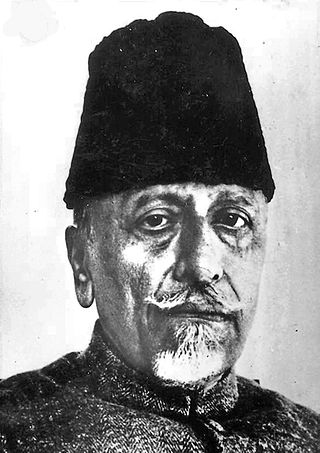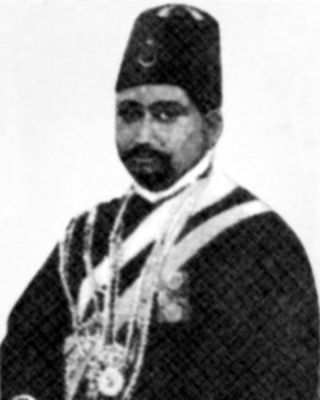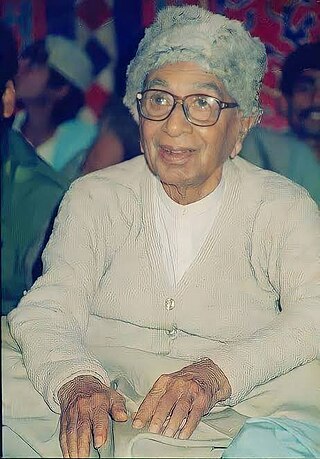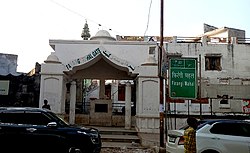
The Deobandi movement or Deobandism is a revivalist movement within Sunni Islam that adheres to the Hanafi school of law. It formed in the late 19th century around the Darul Uloom Madrassa in Deoband, India, from which the name derives, by Muhammad Qasim Nanautavi, Rashid Ahmad Gangohi, and several others, after the Indian Rebellion of 1857–58. They opposed influence of non-Muslim cultures on the Muslims living in South Asia. The movement pioneered education in religious sciences through the Dars-i-Nizami associated with the Lucknow-based ulama of Firangi Mahal with the goal of preserving traditional Islamic teachings from the influx of modernist, secular ideas during British colonial rule. The Deobandi movement's Indian clerical wing, Jamiat Ulema-e-Hind, was founded in 1919 and played a major role in the Indian independence movement through its participation in the Pan-Islamist Khilafat movement and propagation of the doctrine of composite nationalism.

Abul Kalam Ghulam Muhiyuddin Ahmed bin Khairuddin Al-Hussaini Azad ; 11 November 1888 – 22 February 1958) was an Indian independence activist, writer and a senior leader of the Indian National Congress. Following India's independence, he became the First Minister of Education in the Indian government. He is commonly remembered as Maulana Azad; the word Maulana is an honorific meaning 'Our Master' and he had adopted Azad (Free) as his pen name. His contribution to establishing the education foundation in India is recognised by celebrating his birthday as National Education Day across India.
The Khilafat movement (1919–22) was a political campaign launched by Indian Muslims in British India over British policy against Turkey and the planned dismemberment of the Ottoman Empire after World War I by Allied forces.

The Barelvi movement, also known as Ahl al-Sunnah wal-Jama'ah is a Sunni revivalist movement that generally adheres to the Hanafi and Shafi'i schools of jurisprudence, and Maturidi and Ash'ari schools of theology with hundreds of millions of followers, and it encompasses a variety of Sufi orders, including the Chistis, Qadiris, Suhrawardis and Naqshbandis as well as many other orders of Sufism. They consider themselves to be the continuation of Sunni Islamic orthodoxy before the rise of Salafism and the Deobandi movement.

Ahmed Raza Khan Barelvi Qadri, known reverentially as A'la Hazrat, was an Indian Islamic scholar and poet who is considered as the founder of the Barelvi movement and the Razvi branch of the Qadri Sufi order.
Abdul-Aziz ibn Abdullah ibn Baz, popularly known as Bin Baz or Ibn Baz, was a Saudi Arabian Islamic scholar who served as the Grand Mufti of Saudi Arabia from 1993 until his death in 1999 (1420AH). According to French political scientist Gilles Kepel, ibn Baz was a "figurehead" whose "immense religious erudition and his reputation for intransigence" gave him prestige among the population of Saudi Arabia. He "could reinforce the Saud family's policies through his influence with the masses of believers".
Syed Nazeer Husain Dehlawi was an Islamic scholar and leader of the reformist Ahl-i Hadith movement in India. Earning the appellation shaykh al-kull for his authority among early Ahl-i Hadith scholars, he is regarded, alongside Siddiq Hasan Khan (1832–1890), as the founder of the movement and has been described as "perhaps the single most influential figure in the spread of the Ahl-i-Ḥadīth".

Syed Ismail Hossain Siraji was a Bengali author and poet from Sirajganj in present-day Bangladesh. He is considered to be one of the key authors of period of the Bengali Muslim reawakening; encouraging education and glorifying the Islamic heritage. He also contributed greatly to introducing the Khilafat Movement in Bengal, and provided medical supplies to the Ottoman Empire during the Balkan Wars. Anal-Prabaha, his first poetry book, was banned by the government and he was subsequently imprisoned as the first South Asian poet to allegedly call for independence against the British Raj. The government issued Section 144 against him 82 times in his lifetime.

Mahmud Hasan Deobandi was an Indian Muslim scholar and an activist of the Indian independence movement, who co-founded the Jamia Millia Islamia University and launched the Silk Letter Movement for the freedom of India. He was the first student to study at the Darul Uloom Deoband seminary. His teachers included Muhammad Qasim Nanawtawi and Mahmud Deobandi, and he was authorized in Sufism by Imdadullah Muhajir Makki and Rashid Ahmad Gangohi.

Shabbir Ahmad Usmani was an Islamic scholar and an activist of the Pakistan Movement, who served as the Shaykh al-Islām of Pakistan in 1949.
Fazl-e-Haq Khairabadi was a Hanafi jurist, rationalist scholar, Maturidi theologian, philosopher and poet. He was an activist of the Indian independence movement and campaigned against British occupation. He issued an early religious edict in favour of doing military jihad against British colonialism during 1857 and inspired various others to participate in the 1857 rebellion. He wrote Taḥqīqulfatvá fī ibt̤āl al-t̤ug̲h̲vá in refutation of Ismail Dehlvi's Taqwiyat al-Imān and authored books such as al-S̲aurah al-Hindiyah.
Abdul Bari Firangi Mahali (1878–1926) was an Indian Muslim scholar and writer from the Firangi Mahal palace in Lucknow. He authored 111 books.

Ghulam Murtaza Syed, known as G. M. Syed was a prominent Sindhi politician, who is known for his scholarly work, passing only constitutional resolution in favor of the establishment of Pakistan from British India's Sindh Assembly in 1943. Later proposing ideological groundwork for separate Sindhi identity and laying the foundations of Sindhudesh movement. He is regarded as one of the founding fathers of modern Sindhi nationalism.

Jamiat Ulema-e-Hind or Jamiat Ulama-i-Hind is one of the leading organizations of Islamic scholars belonging to the Deobandi school of thought in India. It was founded in November 1919 by a group of Muslim scholars including Abdul Bari Firangi Mahali, Kifayatullah Dehlawi, Muhammad Ibrahim Mir Sialkoti and Sanaullah Amritsari.

Anjuman-i-Ulama-i-Bangala, was an association of Muslim religious leaders in British India's Bengal Presidency. It later formed a branch of the Jamiat Ulema-e-Hind by the name Jamiat Ulema-e-Bangala in 1921.

Pir Syed Jamaat Ali Shah was a Pakistani author, Islamic scholar and Sufi saint of the Naqshbandi Order. He presided over the All India Sunni Conference and led the Movement for Shaheed Ganj Mosque. He was a contemporary of Ahmed Raza Khan Barelvi, the founder of Barelvi movement.

Abd al-Ḥāmid al-Qādirī al-Badāyūnī, also known as Mujahid-e-Millat, was an Indian-Pakistani Islamic scholar, Sufi, poet, and leader from Pakistan. He was the founder of the Islamic college Jamia-Talimat-e-Islamiya located in Karachi.
Abul Muhasin Muhammad Sajjad was an Indian Islamic scholar who was one of the most influential ulemas of the 20th century. Sajjad was a founder of Anjuman-Ulama-i-Bihar, Jamiat Ulema-e-Hind, and Imarat-i-Sharia. A leader in the Indian independence movement, Abul Muhasin Muhammad Sajjad participated in the Non-cooperation Movement, Khilafat Movement, and Civil Disobedience Movement; he opposed the partition of India and championed the concept of composite nationalism. He also founded the Muslim Independent Party in 1935 to represent Muslims in Bihar who were disillusioned with Congress and the Muslim League.The Muslim Independent Party formed the government in Bihar in 1937. Yunus, the party president, became the chief minister of Bihar on 1 April 1937.











